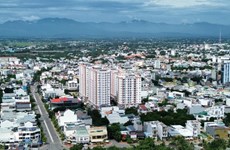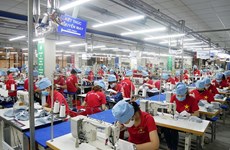Poor logistics industry retards economy
Demand for logistics services has risen rapidly, but the
plan to develop a professional logistics centre in HCM City is still on
the drawing board, experts say.
Demand for logistics services has risen rapidly, but the
plan to develop a professional logistics centre in HCM City is still on
the drawing board, experts say.
In recent years, the country poured money into infrastructure projects, but the lack of a professional logistics industry was retarding the competitiveness of the economy, according to experts.
With 600 to 700 logistics companies out of a total of 800 to 900 in the country, HCM City has many advantages to develop a logistics industry, especially in marine, interior waterways, air, rail, road and pipeline transport services.
In an effort to develop a seaport and interior waterway systems, the city government last year ordered the HCM City Export Processing Zone Authority (Hepza) to map out a scheme to build a professional logistics hub for the 2010-20 period. But to date, the plan has not been carried out because of dis agreements among agencies, according to Nguyen Van Minh, director of the Industrial and Information Service Centre under Hepza.
Currently, most logistics services, including transportation, warehousing and yard storage of goods and cargo were done by foreign companies, Minh said.
According to the Vietnam Freight Forwarders Association, domestic logistics companies can meet only 25 percent of local demand.
With the small size and limited ability of local companies, including out-of-date technology, the companies can offer only limited services.
Marine transportation services-a key logistics services-transport 90 percent of import-export cargo, but local companies can meet only 18 percent of that demand, according to the Vietnam Maritime Administration.
Demand for logistics services is expected to soar, and the industry will become a key economic sector, contributing up to 15 percent of the country’s total GDP, experts have said.
More international companies are eager to join the Vietnam market.
Under Vietnam ’s WTO commitments in the logistics sector, restrictions on the percentage of foreign capital contributions, as well as other restrictive conditions, will be gradually removed. By 2012-14, capital contributions can be wholly invested from foreign sources.
Experts said the city should consider hastening development of a professional, local logistics industry before it was too late./.
In recent years, the country poured money into infrastructure projects, but the lack of a professional logistics industry was retarding the competitiveness of the economy, according to experts.
With 600 to 700 logistics companies out of a total of 800 to 900 in the country, HCM City has many advantages to develop a logistics industry, especially in marine, interior waterways, air, rail, road and pipeline transport services.
In an effort to develop a seaport and interior waterway systems, the city government last year ordered the HCM City Export Processing Zone Authority (Hepza) to map out a scheme to build a professional logistics hub for the 2010-20 period. But to date, the plan has not been carried out because of dis agreements among agencies, according to Nguyen Van Minh, director of the Industrial and Information Service Centre under Hepza.
Currently, most logistics services, including transportation, warehousing and yard storage of goods and cargo were done by foreign companies, Minh said.
According to the Vietnam Freight Forwarders Association, domestic logistics companies can meet only 25 percent of local demand.
With the small size and limited ability of local companies, including out-of-date technology, the companies can offer only limited services.
Marine transportation services-a key logistics services-transport 90 percent of import-export cargo, but local companies can meet only 18 percent of that demand, according to the Vietnam Maritime Administration.
Demand for logistics services is expected to soar, and the industry will become a key economic sector, contributing up to 15 percent of the country’s total GDP, experts have said.
More international companies are eager to join the Vietnam market.
Under Vietnam ’s WTO commitments in the logistics sector, restrictions on the percentage of foreign capital contributions, as well as other restrictive conditions, will be gradually removed. By 2012-14, capital contributions can be wholly invested from foreign sources.
Experts said the city should consider hastening development of a professional, local logistics industry before it was too late./.













